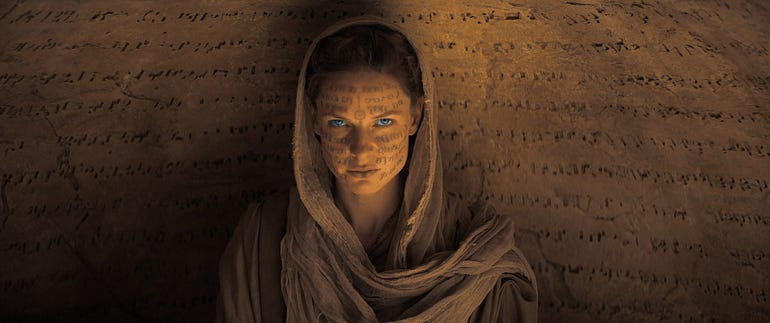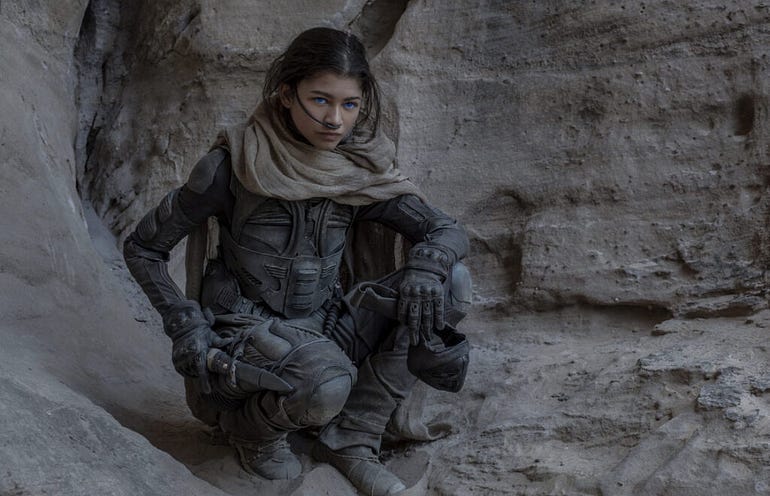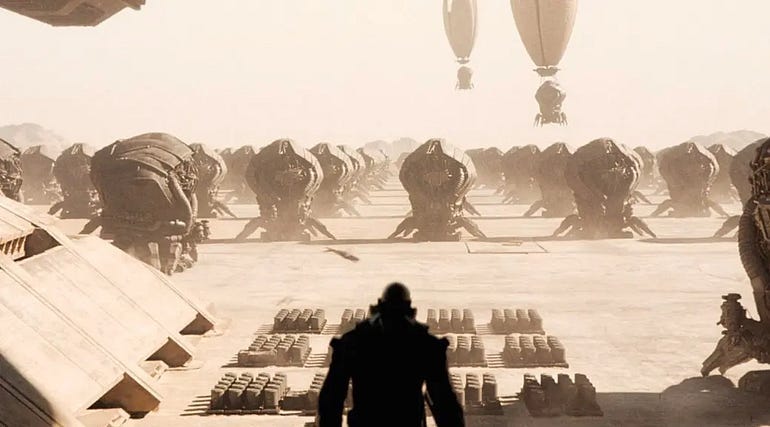Review: Dune: Part One
Denis Villeneuve’s Adaptation is a Triumph of Sci-Fi Filmmaking.
Dune. Arrakis. A desert planet, 20,000 years into the future. Endless sands stretch across the horizon, interrupted only by jagged rock formations. Against this harsh backdrop, a mother and son move quietly over the dunes, aiming for the safety of rocky outcroppings. They are the last survivors of a noble family, traversing the night to avoid the monstrous sandworms lurking beneath the surface.
Their steps give them away. Despite trying to mask their footfalls, a sandworm senses the vibrations. It surges toward them. They run.
Frank Herbert’s Dune novels are pillars of science fiction, widely regarded as genre-defining classics. Herbert’s epic series, which begins with Dune and spans five more books, delves into themes of religion, fanaticism, environmentalism, and eugenics, exploring the perils of following charismatic leaders. Herbert’s universe, centered around young Paul Atreides and his lineage, poses as many philosophical questions as it answers, and fans have continued debating and analyzing its ideas since the release of the first book in 1965.
Bringing Herbert’s complex work to the screen has challenged filmmakers over the years. David Lynch’s 1984 version, often regarded as a cult classic, is still remembered for its controversial reception. Other adaptations, like TV mini-series, met with mixed success. But Denis Villeneuve’s Dune has raised the bar. Villeneuve delivers an epic film, with sweeping landscapes, massive battles, and a distinctly arthouse sensibility. Dreamlike sequences and hints of a potential future give Dune a grandeur that feels both intimate and colossal. Drawing on his previous work in Arrival and Blade Runner 2049, Villeneuve has crafted a unique, unforgettable adaptation.
Much has been said about Paul Atreides, the young nobleman masterfully portrayed by Timothée Chalamet. Paul is an unusual, often troubling protagonist, prompting questions about the “white savior” trope, the dangers of fanaticism, and the risks of unquestioning loyalty. These are questions Herbert intended us to ask — questions we still must ask today. Villeneuve doesn’t shy away from these nuances, grounding Paul’s journey in moral complexity.
The ensemble cast gives strong, layered performances. Oscar Isaac brings a stoic dignity to Duke Leto, Paul’s father and head of House Atreides, who faces his impending doom with grace. Rebecca Ferguson shines as Lady Jessica, a Bene Gesserit balancing her allegiance to her order with her love for her son. The cast includes Stellan Skarsgård as the sinister Baron Harkonnen, Josh Brolin, Zendaya, Javier Bardem, Chang Chen, and David Dastmalchian. Rounding out the cast are Jason Momoa and Dave Bautista, adding intensity as Duncan Idaho and Glossu “The Beast” Rabban, respectively.
Watching Dune, I expected high-quality science fiction, but the film exceeded all expectations. Villeneuve’s Dune is a stunning cinematic experience, with vast alien landscapes, epic battles, and unforgettable character moments. The film’s locations are beautifully shot: Caladan was filmed along Norway’s rugged coastlines, and Arrakis captures the haunting beauty of the endless desert. Despite the devastation that unfolds, there’s a poetic calm woven into Arrakis’s harsh landscape.
Villeneuve’s adaptation is faithful to Herbert’s novel. While reading the book isn’t necessary, it can deepen the experience; as with any adaptation, several elements are condensed or modified. The film includes ample exposition, yet Herbert’s intricate universe still offers layers that are best explored on the page.
Villeneuve’s Dune is a powerful, emotional story that merges grandeur with subtlety. It presents breathtaking visuals, sweeping battles, and a haunting exploration of Paul’s journey, all accompanied by Hans Zimmer’s amazing, Oscar-winning score. This film stands among Villeneuve’s best, and it’s only the beginning. The 2024 sequel, Dune: Part Two, has already received high praise from critics and fans alike, and Denis Villeneuve is hard at work on the third and final film in his planned trilogy. Meanwhile, the series Dune: Prophecy, set to release in November 2024, will expand the Dune universe with tales from another era of its history.
Note on the Timeline: The story is set in the year 10,191 After Guild, approximately 20,000 years into our future. This detail clarifies that the year is not in AD, as some reviewers thought when the film first premiered.





